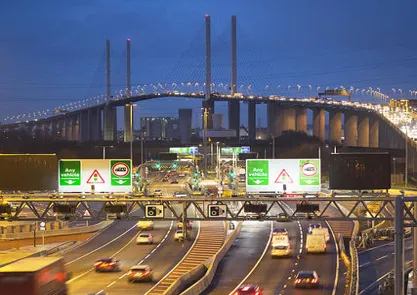
Mexico recently implemented one of the largest remote toll systems in the world, covering 4,000km of the country’s public highways. Deployed and maintained by Spanish consulting and technology company
Reporter Andrew Bardin Williams interviewed Maite Safón, Indra’s head of transport in México, via email about the remote tolling solution and the company’s momentum in Latin America. Safón’s answers have been edited to account for translation from Spanish.
ABW: How did this project come about?
Maite Safón: This was a public tender for renewing the entire remote tolling equipment of roads operated by CAPUFE and for remote tolling operations themselves.
In addition to this renewal, remote tolling equipment was installed in a larger number of lanes that significantly increased the remote tolling capacity of toll booths, thereby improving vehicular traffic flow and improving service for users.
ABW: How did your company become involved?
Safón: An RFP was announced in which we participated as technology partner with the current remote tolling operator Telepeaje Dinámico (TEDISA). We were contracted to implement its technology with a consortium including Impulsora de Servicios Terrestres, Cointer Concesiones, Azvi Cointer Concesiones and Integra Ingeniería.
The government of Mexico awarded the consortium the project after it obtained the highest score among the technical proposals presented.
Indra has been a pioneer in implementing free-flow toll systems based on a remote tolling payment mode in different countries, including Mexico. It is one of the first companies to implement multi-contract toll systems that enable the management and operation of several highways.
ABW: What does the contract include?
Safón: The contract includes the management and maintenance of the remote tolling systems for the entire network of state-controlled toll roads. Specifically, Indra implemented and commissioned its remote toll system technology for the entire [CAPUFE-operated] public highway network in Mexico, with almost 500 lanes totalling approximately 4,000km. This represents approximately 45% of the country’s [tolled] highways.
The solution includes new remote toll systems and telecommunications equipment as well as subsystems for billing, communications, customer service and the back office.
ABW: Why was remote tolling chosen for this particular project?
Safón: Remote tolling results in a smoother traffic flow and faster travel speed than toll systems that require payment in cash and subsequent halt of vehicles. In addition, interoperability across several of the country’s remote toll system operators was implemented within the project’s framework so that drivers can use a single TAG for roads managed by different operators.
ABW: What does the Mexico project mean for drivers and for traffic flow in general?
Safón: Drivers may pay without stopping, allowing for faster traffic flow. The TAG may be prepaid, where a driver can deposit money toward a balance before reaching the toll area, otherwise the system will not grant access to the highway. Alternatively, drivers can set up post payment that is automatically debited from a bank account or credit card so that access is always permitted, except in cases of non-payment in a previous toll area.
And because the system unifies different electronic payment programs, a driver may pass through any toll booth regardless of TAG brand. The system is also scalable so that future payments may also be made on other roadways in addition to these initial highways.
ABW: Are there benefits for toll operators?
Safón: Firstly, it provides greater customer loyalty. Secondly, it enables greater control and monitoring of drivers – enabling operators to collect critical statistics, analyse journeys and forecast peak and off-peak times.
ABW: What does the future hold for this project and for remote tolling in Mexico in general?
Safón: Through this project, TAG has increased its penetration across Mexico. And more operators are being added to the system - especially smaller concessions in rural areas far from the capital.
Mexico has for some years been investing in smart transport technology. In addition to this project with CAPUFE, other examples using Indra technology include the traffic management system and the intelligent traffic systems (ITS) in the Necaxa-Tihuatlán highway; ITS, toll and remote toll systems for the Guadalajara-Tepic highways; ticketing and security systems for the Mexico City suburban railroad; and toll and ITS systems on the Arco Norte freeway and Circuito Exterior Mexiquense roadways.
This particular project is a global benchmark due to its volume and complexity. We were able to transition between operators in just a few days and implement interoperability across the country.
Other transport projects
Safón: Indra’s technology is used on subways, trains, suburban rail and even Kuala Lumpur’s monorail. Our technology also manages more than 14,600 buses worldwide, with projects in the Americas, including Latin America, and Europe.
Tunnels equipped with our control systems have received top ratings in the EuroTAP studies. In London our technology controls and permits centralised operation of 12 street tunnels and the 90km of metropolitan streets connected with these.
The Hermes solution has been selected for the management of major road tunnels in Europe, Africa, India, China and the American continent.
It is currently being deployed in the Bouïra tunnels in Algeria and the Line 2 tunnel for the Mashhad metro in Iran.








